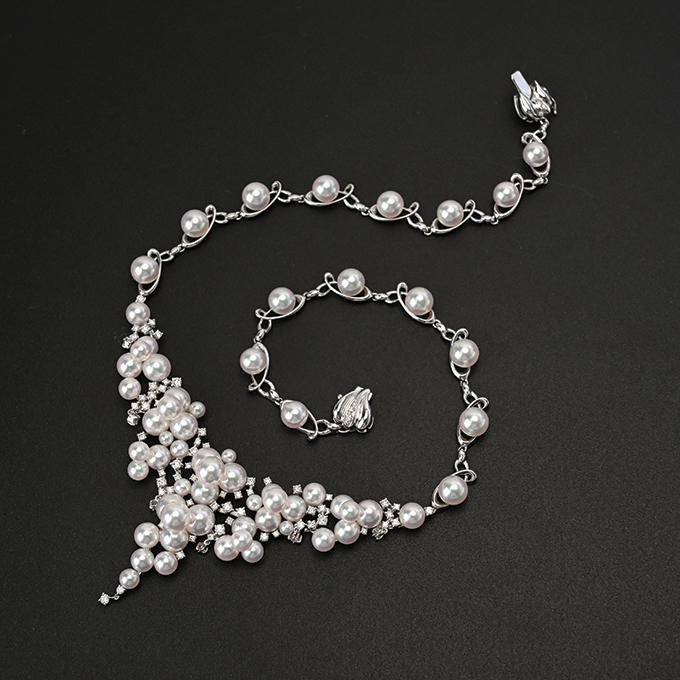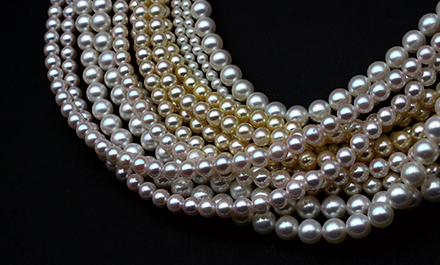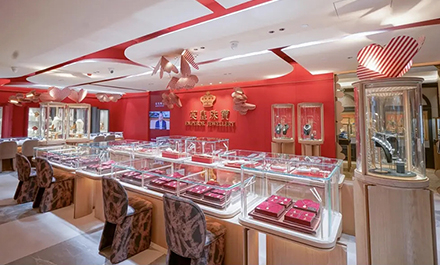The Chinese pearl industry, having demonstrated resilience and versatility amid challenges, counts on widespread adoption of e-commerce, advancements in cultivation technology and the pearl’s inimitable beauty to propel business to new heights.
This article first appeared in the Pearl Report 2023-2024.
The world has witnessed significant transformations across various industries over the past few years. What has remained stable and seemingly constant is an unwavering demand for loose pearls and pearl jewellery in China.
Retail sales of pearl jewellery in China reached RMB24 billion (around US$3.3 billion) in 2022, accounting for around 3 per cent of the country’s total jewellery sales, according to data from the 2022 China Jewellery Industry Development Report by the Gems & Jewelry Trade Association of China (GAC).
Celebrated for their versatility, pearls provide consumers with diverse style options for any occasion. This explains the growing demand for a wider range of products, from affordable rice pearls to premium gems, said Tu Xingcai, president of Shenzhen Pearl Industry Association and chairman of Shenzhen Matis Jewelry Co Ltd.
“We are seeing more celebrities wearing pearl jewellery on TV shows and in livestreaming sessions, which helps raise awareness of pearls. This so-called ‘celebrity effect’ is a powerful way to promote pearls,” noted Tu.
Solid sales
Freshwater pearls are enjoying solid growth in China. According to Emma Zhou, sales manager of HW Pearl Co Ltd, the company’s headquarters in Zhejiang, China received a great deal of freshwater pearl orders post-pandemic. She said, “Chinese consumers showed greater acceptance of price and demand for freshwater pearls as compared to overseas markets.”
Zhejiang Hui Bao Pearl Co Ltd, which specialises in freshwater pearl farming, processing and sales, established HW Pearl in 2008. It mainly sells domestically but also ships pearls to the major markets of Europe, the US, Australia, Japan, South Korea, Hong Kong and Southeast Asia.
Amid growing demand in China is a noticeable shift in consumer preferences. This stems largely from economic fluctuations and evolving purchasing habits driven mainly by the advent of alternative sales channels such as livestreaming, said Zhan Weijian, chairman and general manager of Grace Pearl (HK) Co Ltd and Zhejiang Dongfengshenzhou Pearl Group Co Ltd – developers of the Edison Pearl.
Edison Pearl is a new type of large-sized freshwater pearl that comes in a range of colours.
“Pearls used to be regarded as an expensive purchase best suited for mature women. Today, given the introduction of more youthful designs, pearl jewellery has become an affordable luxury. The ‘celebrity effect’ has also increased the gem’s appeal among young women,” he noted.
According to Zhan, premium gems including South Sea, Tahitian and Akoya pearls as well as Edison Pearls continue to benefit from stable consumption in both international and domestic luxury jewellery markets. Meanwhile, freshwater pearls are also highly favoured, particularly white rice pearls of 3mm to 6mm in diameter.
Shifting preferences
Industry stakeholders at the World Pearl Conference held in May 2023 in Zhuji, Zhejiang province, China, attested to freshwater pearls’ increasing popularity, thanks to their younger, more versatile appeal, especially among a new generation of buyers.
Meanwhile, the market also saw growing demand for pearls in irregular shapes and unique colours, which are mainly eye-catching to buyers opting for a more personalised style. What mostly sells are medium- to high-quality pearls, according to industry players.
Allen Gao, general manager of QingDao HongSheng Jewelry Co Ltd, said baroque pearls are gaining popularity for their attractive appearance and relatively affordable prices. Gao added that China’s growing interest in golden South Sea, rainbow-golden and Tahitian pearls is expected to continue.
QingDao HongSheng Jewelry is a pearl wholesaler and pearl jewellery retailer. Gao remarked, “One of our brands, iPearl Jewelry, specialises in bespoke premium pearl jewellery for local affluent clients. As long as the quality is great, clients are willing to pay a premium for luxury pearl jewellery.”
Owing to the current demand and supply situation, prices of pearls across all categories have surged, surpassing those in previous years. Some varieties such as white South Sea, Akoya and freshwater pearls saw a more significant increase. Zhan of Grace Pearl said, “Prices of white rice pearls rose from RMB4,000 to RMB6,000 (around US$545 to US$822) per kilogram to RMB9,000 to RMB12,000 (around US$1,233 to US$1,644) per kg over the last two years.”
Tu said that since pearls are a cultivable resource, supply could normalise in two to three years, and only then can the market regulate prices to more reasonable levels.
Digital arena
E-commerce and other online initiatives such as livestreaming played a crucial role in driving pearl industry growth.
According to the 51st Statistical Report on China’s Internet Development released by the China Internet Network Information Center, the number of livestreaming viewers in the country reached 751 million as of December 2022, accounting for 70.3 per cent of all internet users there. Of this, 515 million used livestreaming to purchase goods.
Meanwhile, GAC data showed that total online jewellery sales in 2022 reached approximately RMB235 billion (around US$32.2 billion), up 27 per cent year on year. Of these, jewellery sales on Douyin hit above RMB60 billion (about US$8.2 billion).
“The rapid development of e-commerce on social media and livestreaming platforms during the pandemic has brought about immense business opportunities to the pearl industry,” said Zhan.
The rise of the livestreaming phenomenon started on traditional e-commerce platforms Taobao and Tmall and later expanded to Douyin, Xiaohongshu, WeChat and more.
“Livestreaming enables our Edison Pearl brand’s influence to grow exponentially, transforming pearls from an exclusive luxury to an accessible fashion staple. This rapid expansion of the pearl consumer base is fuelling industry growth,” Zhan said.
Grace Pearl’s business focuses on the wholesale and retail of pearls. It has adopted an “online + offline” sales model, using cultural integration, technological innovation, design empowerment and brand endorsement as strategies to build the renowned pearl brand.
Technology and production
Known as the “Pearl Capital of China,” Zhuji City in Zhejiang Province accounts for 70 per cent of total freshwater pearl production worldwide, according to government data. Official reports indicate that Zhuji generated RMB25 billion (approximately US$3.46 billion) in pearl sales in the first four months of 2023, up 60 per cent from last year’s total annual sales.
While freshwater pearls are gaining more traction in the jewellery world, Tu of Shenzhen Pearl Industry Association pointed out that pearl production has largely been reduced due to the government implementing environmental policies to restore clean waters.
“Environmental regulations have significantly impacted pearl farming. Producers have responded by adopting more advanced cultivation techniques, which have boosted yields and improved the colour and quality of the harvest, but that also led to higher production costs,” Tu said.
In the face of this challenge, Grace Pearl has partnered with the Freshwater Fisheries Research Center of the Chinese Academy of Fishery Sciences to develop new mussel species and pearl cultivation technology.
By leveraging the centre’s academic expertise and advanced facilities as well as the company’s extensive pearl cultivation experience, the two entities aim to nurture mussel varieties, which can resolve water pollution while producing premium-quality pearls in higher volumes and special colours.
“Advanced machines also help improve productivity by shortening the time for colour and shape sorting,” Zhan said. “Continuous design and technological innovation is key to sustaining long-term competitiveness. Embracing artificial intelligence is also inevitable as it will widely be applied in pearl cultivation and processing.”












